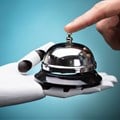The Fourth Industrial Revolution presents an opportunity for the hospitality industry; the people-centred nature of these businesses will likely see human capital remaining an equally integral component to organisational success.
"The Fourth Industrial Revolution brings with it astonishing technology advancements, from artificial intelligence solutions to process automation, all of which poses great opportunity to the hospitality industry, particularly when it comes to streamlining processes that previously required manual or human intervention," notes Robyn Christie, consultant to the travel and hospitality industry and advisor to Agility Corporate during her keynote address at the World Travel Market Africa 2019.
According to Christie, there have been quite a few global experiments with the use of robotics and artificial intelligence in the hospitality industry, which have had mixed results.
"Travellers to some high tech hotels in Japan found it a great novelty to be served by a robot when checking into their accommodation. Initially, the concept made clear business sense with the robots not only serving as a valuable competitive edge, but also removing an often costly human element from the hotel’s payroll."
"Over time, however, it was found that the robots were often unable to appropriately respond to guest queries and were, in fact, creating more unnecessary work for the hotel’s human staff complement. As a result, it was reported earlier this year that one of the flagship automated hotels, the Henna-na 'Strange' Hotel in Nagasaki, had decided to scrap many of the robots used in its operations."
Looking at other hospitality functions such as stock taking and procurement, advanced technology is certainly making these processes far more efficient. However, the need for human labour in controlling these processes will always remain.
Julia Aymonier 27 Mar 2019 Locally, Christie says, the scenario is a bit more interesting and complex. "While industry 4.0 has gradually gained traction in South Africa, it is our people and their well-known hospitability that has greatly contributed to the country’s reputation as one of the top tourist destinations in the world. In fact, I am yet to meet an international, and even local, a tourist who doesn’t cite our friendly nation as one of the main reasons for visiting, or recommending a visit to friends and family."
"Our competitive positioning, both now and into the future, will always be our people and we will have to, quite uniquely in comparison to the rest of the world, ensure that we remain ahead of the technology curve without diminishing that human interface and contact that has made our country globally famous," explains Christie.
Investing in human capital
It is thus critically important that the hospitality industry continues to invest in their human capital and ensure that their wellbeing is as high a priority as the business’ technology strategy. Christie says the employee wellbeing space has greatly evolved in recent years with various specialised solutions available to the market.
"Investing in end-to-end employee health, risk and wellbeing solution provides an opportunity for employers in the hospitality industry to uniquely safeguard their workforce both now and into the future, whatever Industry 4.0 may bring," says Christie.
She adds that even if the Fourth Industrial Revolution eventually succeeds in delivering robots that are capable of performing tasks, such as automated check-in at hotels, the personal touch that human interaction brings to the guest’s hospitality experience is invaluable and remains critical. "The warmth and friendliness of our local people, and particularly hospitality staff, are our greatest ambassadors. The diversity and complexity of cultural richness within South Africa uniquely define our hospitality offering, and this is something robots will never be able to deliver authentically."

































